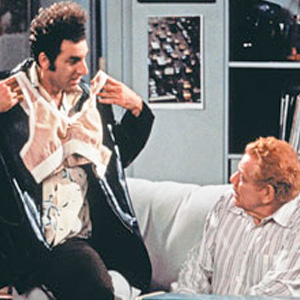What Job Seekers Can Learn from Seinfeld

In honor of the Seinfeld quasi-reunion taking place during the next
few weeks on Curb Your Enthusiasm, we thought it'd be fun to watch
through old episodes of the show re-examine the job tactics of Jerry,
George, Elaine and Kramer, as well as some of the recurring characters
on the show. Much has been written about their personal lives on (and
off) the show, but what about their professional lives?
We asked Tory Johnson to give us her opinions on the lessons we can learn. Tory is the CEO of Women For Hire and author of Fired to Hired. You can also find her on Good Morning America where she is the Workplace Contributor and follow her on Twitter.
Photo Credit: Seinfeld.com
Jerry
Both in real life and on the show, Jerry has had the most consistent
employment. He worked as a successful stand-up comedian and eventually
parlayed that success into a TV show.
LESSON: "Everyone can learn from Jerry's success: It comes
from doing not only what he's good at, but more importantly, what he
really loves. What do you think about outside of business hours even
when you don't have to? That's the stuff you should build a career
on--one that aligns your strengths and passions like Jerry has done.
Comedy is what he's good at and it's what he loves--a powerful
combination."

Elaine
For most of the show, Elaine worked as a writer and editor in
publishing. But later, while hunting for a job, she bumps into the
owner of a clothing company on the street and gets a position out of
it.
LESSON: "Get out of your house. The worst mistake
job seekers make today is hiding behind a computer in an effort to find
work. Be open to those chance encounters. Not every meaningful
encounter has to happen at an oh-so-serious formal networking event.
Playing with your kids at the park, going grocery shopping, attending a
Barnes & Noble book signing by an interesting author---all simple
activities that can lead to an introduction to your next employer if
you're open to the possibilities."

Kramer
He never works, except for a short period where he works at a bagel
shop after allegedly having been on strike for years. Instead of steady
employment, he hatches get rich quick schemes. In one episode, he hires
Cuban immigrants to make cigars only to find out they are actually
Dominicans.
LESSON: "Yikes! It's unsettling to worry month to month how
you'll pay your rent. That lifestyle's not for everyone. One thing,
however, that we've seen in this economy among determined people
without jobs is a willingness to hustle with gigs here and there. From
odd jobs to freelance projects, my hat's off to those who are not at
all shy about figuring out how to make it through a rough patch."

George
He bounces around from one job to the next, holding positions in
real estate and working with the Yankees, and pretending to be an
architect and marine biologist at other times. He is also unemployed
for long stretches of the show. In one episode, he even goes so far as
to make up a company (extra credit if you can name it) that he's
interviewed with in order to keep his unemployment benefits.
LESSON:
"It's hard to feel good about lying, but it's also silly for state
unemployment offices to require that kind of paperwork. As for
job-hopping: it's always a red flag for employers to question why
you're not content in one place for very long. But among younger
generations it's not uncommon to go where the best opportunity takes
you--a free agent mentality--especially after watching parents and
grandparents get pink-slipped despite their loyalty to an employer. So
while cradle to grave employment is totally outdated, flitting around
can ultimately catch up to you in a not so great way. Be strategic in
your moves."
 Newman
Newman
Like Jerry, Newman is consistently employed as a mailman. The
difference is Newman doesn't enjoy his job. He often complains that the
mail never stops. This leads him to take part in several of Kramer's
get rich quick schemes. Still, he never quits his post.
LESSON:
"Nobody relishes sticking with a job they hate, yet there's a lot to be
said about a steady paycheck. A huge reason why we work is money--and
even though he's miserable (something I don't envy), in this economy
it's easier said than done to assume you can up and quit to find
greener pastures elsewhere. Hold on to your job, keep your performance
strong and use side gigs as your source of fun!"
 Soup Nazi
Soup Nazi
He antagonizes customers who come to buy soup from him, but his
product is so good, people keep coming back (that is, until he bans
them from his store outright).
LESSON: "I hate rewarding bad service. No product -- not $5
soup or a $2,500 Gucci bag -- is worth subjecting yourself to that kind
of torture. I'd love to see the Soup Nazi spend a day with Tony Hsieh
[CEO of Zappos.com] who'd show him a thing or two about why sprinkling
some TLC around his shop. It would increase his sales immeasurably."

Mr. Lippman
He is Elaine's boss at Pendant publishing until he's let go after a
big merger. He eventually opens his own store that sells only the tops
of muffins (Elaine's idea).
LESSON: "If I had to choose
today, I'd go for the muffin tops shop over publishing in a heartbeat.
It'd be the new cupcake, which does well no matter what the economy
(unlike publishing, sadly). Entrepreneurship is all about
risks--nothing's a sure bet except perhaps that people still buy baked
goods even when they're down to their last few bucks and owning a
business is a faster way to riches than being an employee. If you can't
get hired now, hire yourself. A service business, however, is cheaper
to launch than a product or a storefront."

Frank Costanza
He worked as cook in the army but is retired by the time the show
starts. However, he does come out of retirement briefly to invent the
Bro (a brassiere for men) with Kramer.
LESSON: "Too many retirees can't even think of retiring in
this economy. They've tapped their already-dwindling 401(k)s or IRAs to
avoid losing their homes. So, it's not a bad idea to keep working in
some capacity. I wouldn't bet my life savings on a bra for men; maybe
those muffin tops are a better idea. I've helped many retirees get
hooked up with customer service related positions. It brings in some
cash and keeps them feeling vibrant. Plus they're more patient and
loyal -- thereby providing better service than many of their younger
counterparts."
 J. Peterman
J. Peterman
Another of Elaine's bosses, Peterman is a flamboyant and jet-setting
entreprenuer who is as successful as he is crazy. He owns a very
lucrative self-named clothing company.
LESSON: "There's a crazy gene in every truly successful
entrepreneur--perhaps not always the case with a boss or executive
who's an employee at the company. But when you actually own the shop
and you've built it from nothing, mixed within that cash, blood, sweat
and tears is a healthy dose of insanity. It's all in the secret sauce."
| Topic | Replies | Likes | Views | Participants | Last Reply |
|---|---|---|---|---|---|
| Job Networking Groups | 0 | 0 | 487 | ||
| Read: How to Write a Cover Letter (+ Samples) | 1 | 0 | 261 | ||
| Keep up to date with the latest ways to get better jobs faster | 0 | 0 | 227 |
